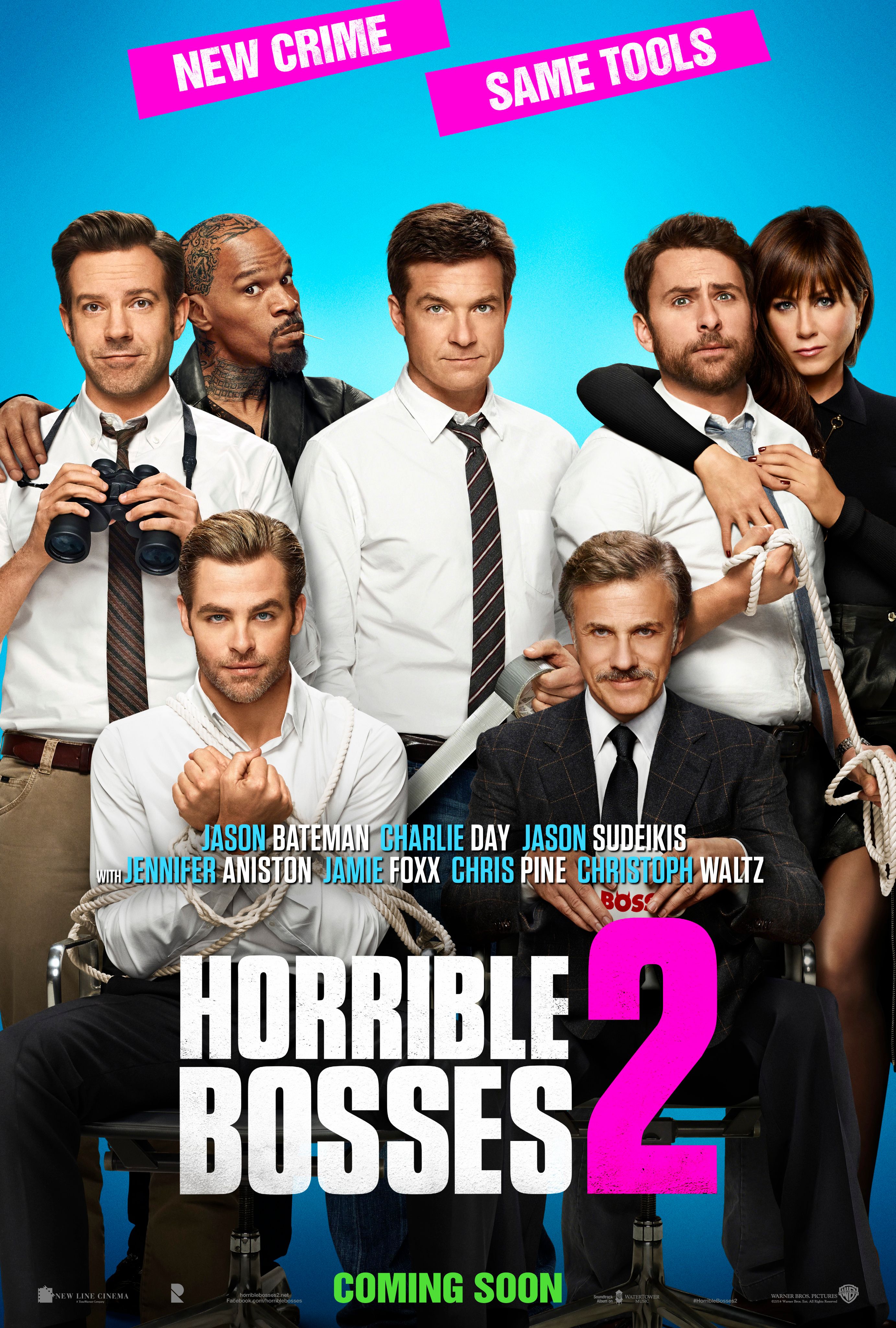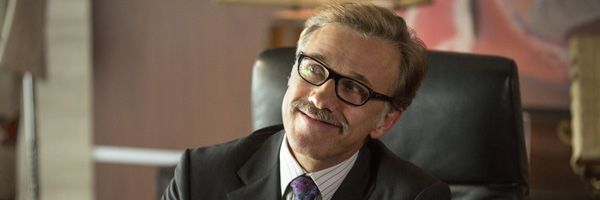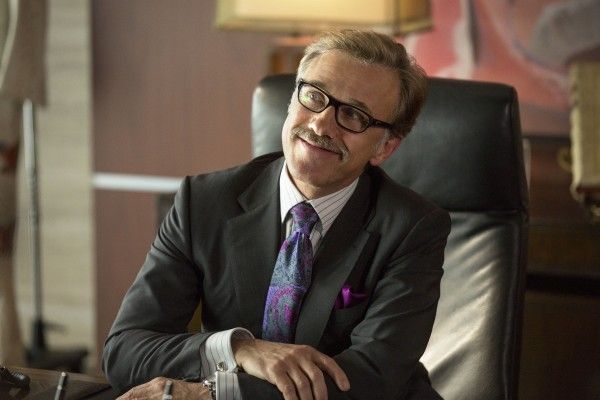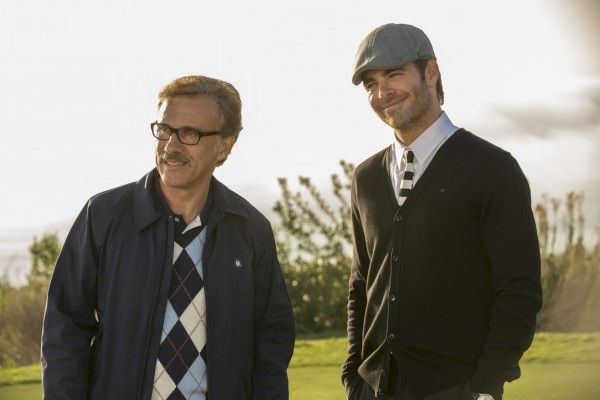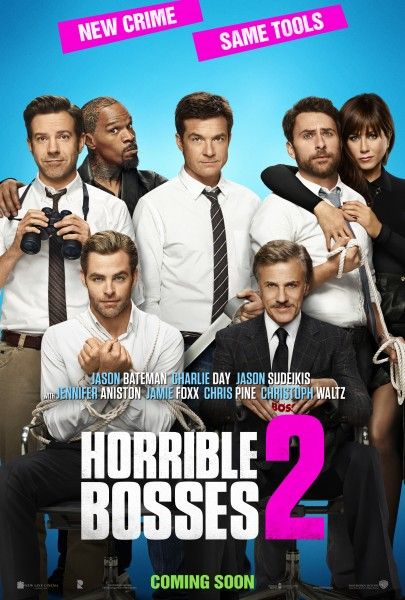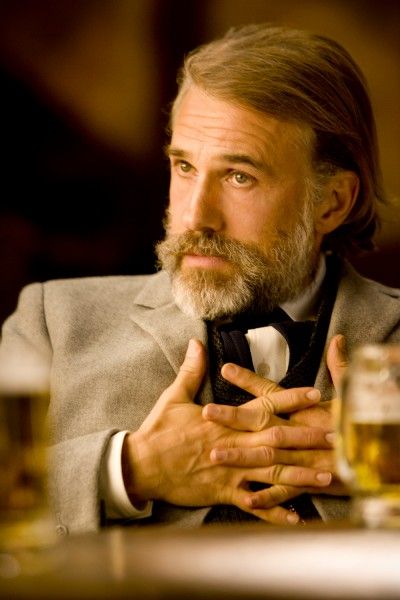Sean Anders’ Horrible Bosses 2 is now in theaters with Jason Bateman, Charlie Day, and Jason Sudeikis reprising their roles from the first film. This time around they decide to be their own bosses by setting out on their own entrepreneurial venture. When a slick investor (Christoph Waltz) steals their idea, they decide to kidnap his son (Chris Pine) and hold him for ransom. Jennifer Aniston, Kevin Spacey, and Jamie Foxx all return for the sequel. While Horrible Bosses 2 isn’t going to win any awards, I’ll admit that I laughed a lot mostly from the great chemistry between Bateman, Day and Sudeikis. For more on the film, watch some clips, read Matt's review, watch the trailer, or here’s all our previous coverage.
At the Los Angeles press day I landed an exclusive interview with Christoph Waltz. He talked about how he got involved in the project, how he prepares for a role and if he does anything different for a comedy, if his process has changed over his career, what it was like working with Tim Burton on Big Eyes, collaborating with director David Yates on Tarzan, and a lot more. Hit the jump to either read or watch what he had to say.
Here's the video of the interview followed by a full transcript.
Collider: For this project, when they pitched you on it, was it an immediate, “Oh my god, I’m doing this?”
CHRISTOPH WALTZ: It was an immediate, “Oh my god, I can’t do that.” I always take the script seriously. Not that I shouldn’t have but what I overlooked was that it is in a certain context.
Oh, so you read the script and you were like, “I’m not doing this.”
WALTZ: But then meeting the people involved, and I’m not just talking about the three guys—some of them I’ve known before. But the director and the producers really did put it in a different context and it started making sense. I started seeing layers and details and elements in it that really, really made me quite enthusiastic about participating. Not least of them that topic.
For you preparing for a role and you’re doing something like this which is, you’re not playing it funny the way the other guys are. Do you prepare any differently when you’re going to be in a comedy or is acting for you the same rigid process?
WALTZ: It’s not a rigid process, somewhere it is the same because microsurgery will be microsurgery and car mechanics will be car mechanics. To confuse the two could have fatal results but every part and every story requires its own unique attention. So, that’s what you try to find out in the run up, so to say, which is the right flight path? Which is the right approach? Which is the most useful?
And in this case, the most useful I think—and it seems to have been the right one—was to take it like any other serious part. Because that’s my part, only in the context hopefully it’s funny but the context is not really what I do. I’m just responsible for the part, so I considered myself responsible for the seriousness, for the straight thing. Apart from the part that it is a mechanical necessity for comedy that you have the serious and straight guy.
One of the things that I found, especially looking at the bloopers of the movie is that the three of them, I would imagine there are a lot of takes that are ruined from people laughing. Or did you not find that to be the case?
WALTZ: I actually didn’t find that to be the case. Yeah, they are funny but again, as a result. Sometimes it happens but it happens surprisingly rarely that you crack up because they came up with something new. If you really focus on what you’re doing then you could see them being funny and acknowledge the fact that they are funny without reacting to it or cracking up. And then, they were at work too, so you understand that they are actually trying to find the best expression for the situation and you participate in that. That in itself is not a laughable situation.
I’m curious how you’ve changed as an actor in the way you do prepare for a role from when you first started to where you are now. Have you maintained a very similar routine or has it been adapted as you’ve gotten further into being an actor?
WALTZ: Well, of course. You develop and if you don’t you should do something else, as simple as that.
Is it now you feel more comfortable taking on a role where you do maybe less work or do you do even more work now?
WALTZ: No, I do more because I know more of how wrong things can go. Not only how things can go wrong but how wrong they can go. So, as you go along you learn more and more about it and you find yourself in a position more and more often where you think, “I have no idea. I have no clue. What am I gonna do?” Now, experience is crucial because now you can open your tool box. But you have to have used the preceding decade to fill your toolbox, so that might be the only difference.
I’m looking forward to Tim Burton’s Big Eyes because it’s not a typical Tim Burton movie of recent years where it’s fantasy filled with CGI and effects. It’s a real story. What was it like being a part of that, making the movie? What was it like collaborating with him?
WALTZ: You see, I consider this a typical Tim Burton movie because how can it not be if it’s Tim Burton?
I don’t mean it like–
WALTZ: I know exactly, I just...I know exactly what you mean and I’m grateful for throwing me that ball, so I answered back. It is very much a typical Tim Burton movie because it might not have the branding so much. It might not have the Tim Burton, whatever it is. I don’t even think about it because I love working with him for these reasons. Everything he does is typically Tim Burton.
He doesn’t submit to commercial considerations ahead of creative ones. He is the true artist and the way he expresses himself, you have to live up to the occasion the way he demands to fulfill that expectation, or that hope rather, that he puts in you by casting you. Apart from the challenge, it’s wonderful to see him exercise his marvels.
Have you seen a rough cut yet or the film?
WALTZ: No, I haven’t.
So you’re seeing it for the first time soon?
WALTZ: I certainly hope so.
I know you’re making Tarzan right now.
WALTZ: It’s done.
You worked with David Yates. What was it like collaborating with him on this version?
WALTZ: He is probably the most circumspectant, considerate person on Earth.
I’ve noticed that.
WALTZ: You have? How so?
I did a set visit on Harry Potter and I’ve spoken to him a few times. He’s just so nice and grounded.
WALTZ: It’s not just nice, it’s beyond nice. He really considers the other person’s position and point of view. And by position I don’t mean in the hierarchy, I mean as a human being in society. He really is, as I said, so circumspect that sometimes I had problems picking up right away what he meant, “Oh. Now I get it, now I get it. He doesn’t want to just order me around.”
He offers various perspectives and approaches, and considerations to consider for yourself and then choose amongst them yourself. After, I understood because I’m just an actor. I’m used to being ordered around. After understanding that he refuses to do that and it’s a conscious choice, it’s not because he’s a weakling. He’s everything but. It’s his conscious choice to never infringe upon your process.
Can you tell people who you play in the film?
WALTZ: No. Go see the movie.

